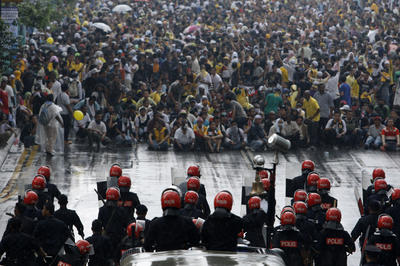
Police eventually dispersed demonstrators with water cannons and tear gas and arrested nearly 1,700. Several were injured (including the opposition leader, Anwar Ibrahim) and one died from injury. Harrowing scenes were shown on news broadcasts around the world, and uploaded to numerous local websites.
Why did this confrontation come about? After all, in recent months Prime Minister Najib Razak has crossed the globe selling Malaysia’s credentials as a democratic and moderate state. Central to his message has been the assertion that elections in Malaysia are free and fair — proven, he says, by the opposition’s large gains in the last national elections.
It is true that in 2008 the opposition won power in five states and cut the government’s national majority to less than the customary two thirds, preventing it from changing the constitution at will. The so-called electoral ‘tsunami’ forced Prime Minister Abdullah to relinquish power one year later.
But this event is hardly proof that elections are free and fair. The opposition countered that if they had been fair the government would have lost their majority altogether. Analysts have long agreed that with government control of the three ‘Ms’ — money, media and machinery (meaning the bureaucracy) — the odds will always be stacked against the opposition.
The formation of ‘The Coalition for Clean and Fair Elections’, or Bersih (clean) in 2006 was an attempt by opposition parties and civil rights NGOs to pressure the government into electoral reform. On 10 November 2007 Bersih held peaceful demonstrations in Kuala Lumpur in support of this cause. Around 50,000 took part — a large turnout considering that police had declared the demonstration illegal and made every effort to prevent it. This success has been widely credited with contributing to opposition gains in the 2008 elections.
After retreating into the background Bersih was re-launched in September 2010 as an entirely non-governmental organisation. Bersih 2.0 is chaired by a respected former President of the Malaysian Bar Council and senior practicing lawyer, Ambiga Sreenavasan. Its multi-racial twelve-member steering committee includes a wide cross section of leaders from the legal fraternity, human rights groups and Islamic organisations.
When Bersih 2.0 announced plans for a second major demonstration on 9 July it listed eight specific objectives: Clean the electoral roll, reform the postal vote, use indelible ink, develop free and fair access to media, institute a minimum 21 days campaign period, strengthen public institutions, end corruption and end dirty politics.
The objectives focus on immediate electoral reform, and the role played by the Elections Commission (EC). Although in theory the EC is an independent institution with wide powers, it has in practice acted in support of the government by, for instance, failing to maintain credible electoral rolls, allowing postal votes, which do not permit public scrutiny of voting by military and police personnel, allowing the government sole access to the mainstream media, and setting very short campaign times of around 10 days. After a recent meeting, European Union diplomats declared the EC ‘not credible’ as they kept referring to themselves as ‘we in the government’.
Government reaction to these objectives and the proposed protest could hardly have been more hostile. They claimed that Bersih was manipulated by the opposition and intended to cause social chaos and overthrow the government by force. The organisation was declared illegal and the demonstration banned. In a massive campaign using the mainstream media, government institutions (including the police and EC), and Friday sermons in mosques, Bersih was linked to anti-Muslim Christian, Jewish and communist conspiracies, and Islamic extremists. The official news agency and Prime Minister Najib alleged that Ambiga was anti-Muslim. And some two hundred Bersih supporters were arrested before 9 July — six, including a parliamentarian, under Emergency Orders allowing indefinite detention without trial.
In a very rare intervention the King called for Bersih and the government to compromise, and suggested the gathering be held in a stadium rather than on the streets. Both sides accepted this, but the government quickly reneged, stating that it could not be at a stadium in Kuala Lumpur. Police then sought to shutdown Kuala Lumpur, and announced a list of 91 individuals (including most Bersih and opposition leaders) who were not permitted to be in the city on 9 July.
That tens of thousands walked in the face of these obstacles was remarkable. This has emboldened the opposition, who have also been encouraged by the effectiveness of social media like Facebook and Twitter for mobilising protest, and engagement by thousands of Malaysians overseas.
Government hostility has been maintained since the event, with claims — defying overwhelming evidence to the contrary — that protesters had been aggressive, and threats of further punitive action. Public protest remains a no-go area. Beyond minor tinkering no electoral reforms would be entertained. Also clear is the fact that unlike in neighbouring Thailand no foreign observers will be accredited in future elections — none have been permitted since 1990.
In the longer term the government may delay a return to the polls. A general election is not due until 2013 but had been widely expected later this year or in the first half of 2012. Despite opposition gains from 9 July the government remains well-placed to win. But without a U-turn towards implementing long-promised democratic reform it may not have the public support to achieve its much-desired two-thirds majority.
- EAST ASIA FORUMJohn Funston is a Visiting Fellow at the School of Culture, History and Language, The Australian National University.



No comments:
Post a Comment
Note: Only a member of this blog may post a comment.